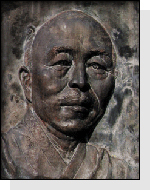- Park In- hwan (1926~1956)
- Park Su- geun (1914~1965)
- Kim Yu- jeong (1908~1937)
- Lee Hyo- seok (pen name Gasan) (1907~1942)
- Kim Dong- myeong (Choheo) (1901~1968)
- Han Yong- un (Buddhist name Manhae) (1897~1944)
- Namgung Eok (pen name Hanseo) (1863~1939)
- Yun Hui- sun (1860~1935)
- Yu In- seok (pen name Uiam) (1842~1915)
- Kim Byeong- yeon (pen name Nango) (1807~1863)
- Nam Gu- man (pen name Yakcheon) (1629~1711)
- Heo Mok (pen name Misu) (1595~1682)
- Heo Gyun (pen name Gyosan) (1569~1618)
- Heo Cho- hui (pen name Nanseolheon) (1563~1589)
- Sinsaimdang (1504~1551)
- Kim Si- seup (pen name Maewoldang) (1434~1493)
- Won Cheon- seok (pen name Ungok) (1330~ ?)
- Lee Seung- hyu (pen name Dongangeosa) (1224~1300)
Kim Dong-myeong (Choheo) (1901~1968)

Hailing from Gangneung, he was a poet and critic on politics. His pen name was Choheo.
In 1920, he graduated from Yeongsaeng Middle School in Hamheung, and taught in an elementary school. He thenafterwards went to Japan to attend and graduate from Aoyama School with a major in theology. He came back home, and continued teaching in Wonsan. In 1947, he defected to South Korea. In 1960, he served as a Professor at Ewha Womans University. He also served as a Parliamentarian.
In 1923, he made his debut in the literary world with the poem ‘If You Open the Door to ’Me’, dedicated to the French poet Baudelaire.
In 1930, he published his first poetry book titled ‘Naui Geomungo’ (My Korean Harp with Six Strings), and a second poetry book titled ‘Pacho’ (Banana Plant). ‘Pacho’, his representative poetry book, esthetically and transparently depicts the sorrow and nostalgia for the fatherland of the author who lives a humble life under the suppression of the Japanese colonial rule.
Following Korean Independence from Japanese rule, he grew concerned about political and social affairs, emerging from the idyllic, pastoral world. He then wrote many commentaries on politics . These were published in newspapers and magazines alike. He published poem books: ‘38th Parallel’, ‘Sky’, ‘Pearl Harbor’, and ‘My Heart’; as well as political commentaries: ‘Enemy and Friend’, ‘Behind History’, etc. In 1954, the poem book Jinjuman (Pearl Harbor) won the Asia Freedom Literary Prize (Asian Free Literature).
He is respected as a representative poet in the modern poetry world, and is widely known for his poems ‘Pacho’ (banana plant) and ‘Nae maeum-eun’ (My Heart).
In 1920, he graduated from Yeongsaeng Middle School in Hamheung, and taught in an elementary school. He thenafterwards went to Japan to attend and graduate from Aoyama School with a major in theology. He came back home, and continued teaching in Wonsan. In 1947, he defected to South Korea. In 1960, he served as a Professor at Ewha Womans University. He also served as a Parliamentarian.
In 1923, he made his debut in the literary world with the poem ‘If You Open the Door to ’Me’, dedicated to the French poet Baudelaire.
In 1930, he published his first poetry book titled ‘Naui Geomungo’ (My Korean Harp with Six Strings), and a second poetry book titled ‘Pacho’ (Banana Plant). ‘Pacho’, his representative poetry book, esthetically and transparently depicts the sorrow and nostalgia for the fatherland of the author who lives a humble life under the suppression of the Japanese colonial rule.
Following Korean Independence from Japanese rule, he grew concerned about political and social affairs, emerging from the idyllic, pastoral world. He then wrote many commentaries on politics . These were published in newspapers and magazines alike. He published poem books: ‘38th Parallel’, ‘Sky’, ‘Pearl Harbor’, and ‘My Heart’; as well as political commentaries: ‘Enemy and Friend’, ‘Behind History’, etc. In 1954, the poem book Jinjuman (Pearl Harbor) won the Asia Freedom Literary Prize (Asian Free Literature).
He is respected as a representative poet in the modern poetry world, and is widely known for his poems ‘Pacho’ (banana plant) and ‘Nae maeum-eun’ (My Heart).
최근 업데이트 2023-01-10


